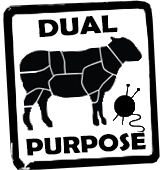
RARE BREEDS TRUST OF AUSTRALIA
powered by TidyHQSheep: Lincoln
Sheep: Lincoln
Origin
Lincolnshire, England
Australian Status

International Status
Breed traits
The fleece of the Lincoln is a strong, heavy wool that typically weighs 5-7 kilograms. Considered a long wool breed, the staple length can be 18-25cm in length. The ASSBA suggests Lincoln fleece should be, "very weighty and of good strength, showing character, wavy, golden bright of intense lustre. Long in the staple with a broad, firm handling lock." The micron count is approximately 38-40, making it a very strong fibre. It was traditionally used for making wigs for the legal profession.
Uses

Wool, Meat, Sire of first cross ewes
History
The Lincoln is one of several breeds that has thrived in the midland counties of England from Roman occupation times. They were a major contributor to the prosperity of Great Britain when the economy was closely tied to the wool industry. But the breed never really had its Glory Days in Great Britain. The hype at the time was given to the glamour of the Leicester breed. The Lincoln, however, found its fame in the New World.....in Argentina, New Zealand and Australia.
History in Australia
It is probable that Lincolns arrived in Tasmania during the 1830's but the greatest impact of Lincolns on our landscape took place in 1858 when Dr Browne of Moorak, near Mount Gambier, introduced Lincolns to cross with his Merinos. At the time they were described as, "monstrous big sheep" that were "literally as big and almost as wide as Shetland ponies". Their size and amount of wool, immediately demonstrated that this cross produced more meat and wool than any other Merino combination. The progeny provided the foundation of the Corriedale, although Dr Browne called them Mooraks, at the time.
In Victoria, Lincolns found similar favour and multiplied at an amazing rate, but it was not until after 1880 when refrigeration allowed meat to be shipped back to Great Britain, that the Lincolns really hit their stride. It was a Lincoln euphoria that lasted fifty years and saw hundreds of Lincolns imported, thousands of Lincolns bred across Australia and millions of Lincoln-Merino crosses on Australian sheep stations.
Contribution to Sheep Flock Books in Australia
In 1898, this almost fanatical interest in the Lincoln breed provided the stimulus for Australia's first permanently successful Flock Book and the foundation of the Australian Society of Breeders of British Sheep (ASBBS). Volume 1 of the Flock Book recorded 11,000 Lincolns in 71 flocks with other breeds contributing only about 15% of the total.
Decline of the Lincoln
By around 1920, the trends had changed and the markets were demanding better quality in both wool and meat. Unfortunately, the Lincoln provided quantity but not the quality the market was seeking.....the meat had too much fat and the wool was too strong. The breed went into rapid decline, and its popularity fell into the shadow of its prodigy, the Corriedale. The Lincoln was later also responsible for the Polwarth breed.
Legacy of the Lincoln
The Lincoln sheep provided much to the Australian sheep industry and this was best summed up by Ivan Heazlewood:
"So next time, you notice the Lincolns are catalogued at one of our shows, abandon, for a few minutes, the pursuit of material rewards found in other breeds, allow sentiment to creep into your soul and seek out this sheep that did so much for the development of our sheep industry. Contemplate its size and constitution which modified the Australian Merino to make it suitable for the interior of our continent. Remember that it gave rise to the Corriedale, the Polwarth and that it, in 1897, provided the platform of numerical strength on which to launch our society. Give yourself the privilege of handling its strong but soft, long, lustrous wool and above all applaud and encourage the handful of breeders who continue to maintain flocks of this unique sheep."
Australian Population
2022: Ewes: 271; Rams: 41
2025: Ewes 265; Flocks 10
Breed Organisation
Australian Lincoln Society Inc. https://www.assba.com.au/members/members_listing.asp?Breeds=LINCOLN

